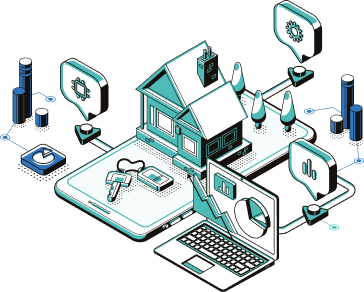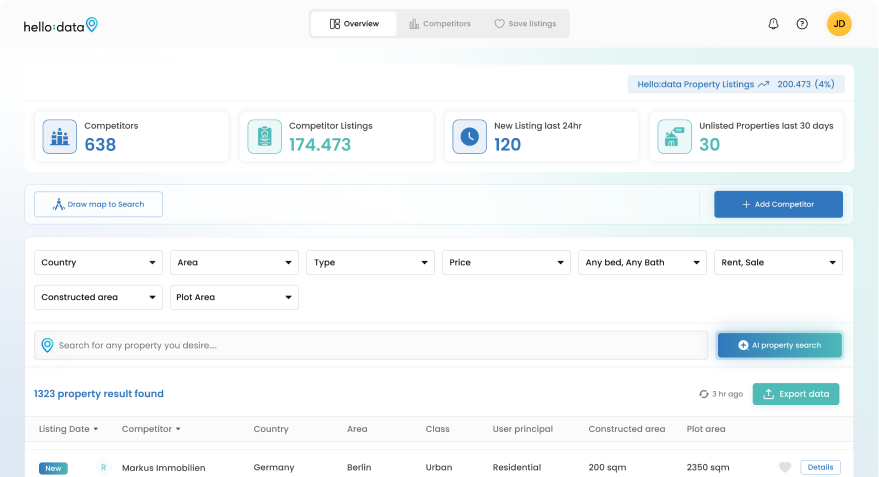Introduction
What is a PropTech company? At its core, PropTech, or property technology, refers to the innovative solutions that leverage technology to enhance the efficiency of real estate transactions.
PropTech is changing the way we buy, sell, and manage properties. It includes various tools and platforms that make processes smoother, improve data management, and make it easier for stakeholders to access information.
Understanding how technology impacts real estate is crucial for anyone wanting to navigate this ever-changing industry. Tech integration not only makes transactions easier but also improves decision-making and operational effectiveness throughout the sector.
Your journey into the world of PropTech begins here.
The Evolution of PropTech
The history of PropTech goes back to the 1980s when early innovations started to change real estate practices. At first, technology focused on basic data management and property listings, which set the stage for future advancements.
Key milestones include:
- 1990s: Emergence of websites dedicated to property listings, making information more accessible.
- 2000s: Introduction of digital tools for property management, enhancing communication between landlords and tenants.
- 2010s: Rapid growth of mobile applications and platforms such as Zillow and Trulia, transforming how consumers engage with real estate.
- Present Day: Integration of advanced technologies like AI, big data, and blockchain into real estate processes.
These developments exemplify the ongoing real estate innovation landscape. Companies leverage technology to improve transactions, streamline operations, and enhance user experiences. As a result, PropTech continues to evolve, fostering greater efficiency and transparency within the industry. This evolution not only addresses current market demands but also sets the stage for future innovations that will redefine how we interact with real estate.
Major Segments of PropTech
1. Smart Home Technologies
Smart home technologies are changing the real estate industry, making properties more valuable and attractive. These innovations use advanced devices in homes and businesses to create convenient, secure, and energy-efficient spaces.
Definition and Benefits
Smart home technologies refer to devices and systems that connect to the internet, allowing homeowners and property managers to control various aspects of their properties remotely. The benefits of adopting these technologies include:
- Increased Property Value: Homes equipped with smart devices often command higher prices in the market.
- Enhanced Security: Smart security systems provide alerts and monitoring capabilities that improve safety for inhabitants.
- Energy Efficiency: Smart thermostats can optimize heating and cooling schedules, leading to reduced utility costs.
Examples of Popular Smart Home Devices
Several smart home devices illustrate this segment’s growth:
- Smart Thermostats: Devices like the Nest Learning Thermostat adjust heating and cooling based on user behavior, providing comfort while minimizing energy consumption.
- Smart Security Systems: Brands such as Ring offer video doorbells and security cameras, enabling homeowners to monitor their property from anywhere.
- Smart Lighting Controls: Philips Hue allows users to customize lighting settings remotely, enhancing ambiance while also supporting energy savings.
Integration Strategies for Property Managers
To fully utilize smart home technologies, property managers should consider these effective integration strategies:
- Evaluate Needs: Identify specific needs within your properties—security enhancements, energy management, or tenant convenience.
- Select Compatible Devices: Choose devices that can seamlessly work together on a unified platform. Compatibility is crucial for maximizing functionality.
- Educate Tenants: Provide residents with training and resources on using smart technologies effectively. Engaged tenants are more likely to appreciate these innovations.
- Monitor Performance: Use analytics tools to track device performance over time. This data can inform future upgrades or adjustments.
Embracing smart home technologies enriches the living experience while elevating commercial property values by address. As technology continues to evolve, staying informed about emerging trends will empower property managers to remain competitive in this dynamic industry.
2. Real Estate FinTech Applications
Financial technology, often referred to as FinTech, is changing how real estate transactions are conducted. By using digital tools, we can make processes smoother, lower costs, and improve efficiency in the real estate industry. Here’s how:
1. Streamlined Transactions
FinTech solutions make transactions easier through automated systems. This means less paperwork and manual work, making it faster and more efficient to buy or sell properties. For example, platforms like ClickPay simplify the complicated process of collecting rent and managing finances.
2. Key Features of Leading Companies
Here are some key features offered by leading companies in the real estate FinTech space:
- ServiceTitan: This platform offers a robust suite of tools for managing service businesses in real estate, enabling professionals to track projects, manage customer relationships, and oversee financial operations seamlessly.
- Roofstock: Focused on single-family rental homes, Roofstock provides an online marketplace where investors can buy, sell, and manage properties easily. Its user-friendly interface minimizes the complexities of real estate investing.
3. Benefits for Buyers and Sellers
FinTech applications bring several benefits to both buyers and sellers in real estate:
- Enhanced Accessibility: Digital transaction tools empower buyers and sellers with immediate access to listings and market data.
- Informed Decision-Making: Investment management software allows users to analyze commercial property value by address quickly. This data-driven approach supports smarter investment choices.
- Improved Communication: Automated updates keep all parties informed throughout the transaction lifecycle, reducing misunderstandings.
The integration of smart home technologies within these FinTech applications enhances their effectiveness, creating a holistic ecosystem that benefits everyone involved in real estate transactions. The future is bright as we embrace these innovations that shape modern property management and investment strategies.
Moreover, understanding concepts such as liquidity in real estate, which refers to how quickly a property can be bought or sold without significantly impacting its price, can further assist investors in making informed decisions.
Additionally, exploring innovative strategies like submetering for multifamily properties can enhance property management efficiency.
Furthermore, comprehending the economic base of a region is crucial as it drives financial stability and growth affecting real estate investments.
Lastly, understanding the process of real estate syndications can open new avenues for investors looking to pool resources for larger investments.
3. Sharing Economy Platforms in Real Estate
The rise of sharing economy models has transformed the real estate landscape. Platforms like Airbnb exemplify this shift, allowing individuals to monetize their properties while providing unique accommodation options for travelers.
Key benefits of sharing economy platforms include:
- Seamless Transactions: Users can easily list, book, and pay for properties online. Features such as online rental payments streamline the financial aspects of property sharing.
- Increased Accessibility: These platforms democratize access to real estate by enabling peer-to-peer property sharing, bridging the gap between hosts and guests.
- Safety Measures: Robust verification processes and user reviews ensure safety and trust among users, enhancing the overall experience.
Smart home technologies complement this model by adding value. Properties equipped with smart devices—like security systems and smart thermostats—attract more renters seeking modern amenities. This combination of technology enhances commercial property value by address.
Automation in property management also plays a crucial role. Property owners can efficiently manage bookings, maintain communication with guests, and monitor the condition of their properties through integrated software solutions. Due diligence automation in real estate is one such example where technology streamlines traditional processes involved in ensuring that a property purchase is sound and compliant.
As these platforms continue to evolve, they redefine how we think about ownership and utilization of real estate assets. The integration of innovations within the PropTech industry emphasizes the importance of adapting to these changes in order to stay competitive.
Sharing economy platforms not only reshape traditional transactions but also pave the way for future advancements in how we engage with real estate. Additionally, computer vision technology is beginning to revolutionize real estate by enabling machines to interpret and understand visual information from the world, which could significantly impact property management and valuation. Furthermore, understanding concepts like the income approach in real estate appraisal, or how financial metrics such as SOFR are changing the real estate game, will be essential for stakeholders in this evolving landscape.
Leading PropTech Companies to Know
Opendoor: Revolutionizing Home Buying with Technology
Opendoor is leading the way in the PropTech industry, changing how we buy and sell homes. Their innovative online platform makes the home buying process quicker and more user-friendly.
Key Features of Opendoor:
- Instant Offers: Sellers can receive competitive offers within minutes, eliminating the lengthy negotiation phase typical in traditional sales.
- Transparent Pricing: The platform provides a clear understanding of all fees involved, ensuring buyers and sellers know what to expect.
- Seamless Transactions: With tools designed for efficiency, Opendoor reduces paperwork and simplifies closing processes, allowing transactions to happen swiftly.
- Virtual Tours and Showings: Buyers can explore properties from the comfort of their homes through immersive virtual tours, enhancing the search experience.
Opendoor empowers both buyers and sellers by removing many traditional barriers in real estate transactions. The technology-backed approach fosters confidence and convenience.
For sellers, this means less time spent on market preparation and open houses. For buyers, it translates to quicker access to listings without the usual stressors involved in home hunting.
The brand’s commitment to leveraging technology drives its mission: democratizing homeownership. Platforms like Opendoor set new standards in an industry often criticized for being slow to adapt.
In a landscape dominated by innovation, companies like Opendoor are paving the way for a future where buying or selling a home is as simple as a few clicks. Embracing these advancements can lead to a more efficient real estate market that meets the needs of modern consumers effectively.
Hello Here: A Game-Changer in Property Matching Efficiency
Hello Here SL is a prime example of the best PropTech companies reshaping the real estate landscape. This innovative AI-driven real estate app is not just revolutionizing property matching and data aggregation, but it’s also addressing common challenges faced by buyers and sellers.
Key Features:
- AI Property Matching: With its advanced algorithms, Hello Here streamlines property searches by offering tailored recommendations based on user preferences. This functionality simplifies the experience, akin to a dating app for real estate. This AI property search technology is setting new standards in the industry.
- Data Aggregation Capabilities: Leveraging its Hello Data Property Tracking system, Hello Here surpasses competitors like Casafari and Idealista. It boasts an impressive four times more listings, providing access to 82,000 properties in areas such as Mallorca compared to Idealista’s 24,000.
The founders, Stephen Nickel and Brahim Zeqiraj, bring extensive experience in real estate and tech development. Their motivation centers around closing the gap in targeted property searches, making buying and selling more efficient and user-friendly.
This combination of AI-driven technology and a robust data framework places Hello Here at the forefront of PropTech innovation, setting a new standard for property matching efficiency.
In addition to its core features, Hello Here also provides valuable insights into various aspects of real estate, such as understanding the lockout period in a commercial mortgage, leveraging location quotient for boosting property investment strategies, and exploring the nuances of multifamily housing and Build-To-Rent (BTR) concepts.
Features and Innovations by Hello Here
Hello Here stands out among the best PropTech companies with its innovative solutions that elevate property transactions.
1. Hello Data Property Tracking
This B2B tool excels in generating and aggregating real estate data, boasting four times more listings than competitors like Casafari and Idealista. For instance, while Idealista offers around 24,000 properties in Mallorca, Hello Data tracks an impressive 82,000 properties, enabling clients to access comprehensive market insights.
2. AI Property Matching App
Designed for consumers, this B2C application simplifies property searches through an intuitive interface similar to dating apps. The app utilizes advanced algorithms to enhance AI listing accuracy, ensuring users receive relevant matches based on their preferences and needs. Hello Here is changing the real estate industry with its advanced AI property search capabilities.
These features exemplify how Hello Here is shaping the future of real estate technology. By addressing the targeted property search gap with AI-driven solutions, Hello Here not only streamlines the process but also sets new standards in property matching efficiency. In the landscape of PropTech, their commitment to innovation positions them as a leader ready to redefine industry norms.
Market Positioning and Goals
Hello Here is positioning itself as a leader among the best PropTech companies, aiming to revolutionize property matching efficiency through advanced AI technology. Its innovative solutions are designed to bridge the gap in targeted property searches, delivering tailored offers that resonate with users’ specific needs.
Key aspects of Hello Here’s market strategy include:
- AI-Driven Efficiency: By leveraging artificial intelligence, Hello Here enhances the property search experience, enabling faster and more accurate matches. This innovation places them at the forefront of the PropTech landscape.
- Global Market Focus: With an initial emphasis on the worldwide market, Hello Here seeks to expand beyond local boundaries. The goal is to create a seamless property matching experience not just in the U.S., but globally.
The aspirations are clear: transform how individuals connect with real estate listings and redefine industry standards. As we examine notable players like Opendoor shaping this dynamic sector, Hello Here stands ready to leave a lasting impact on the real estate market, driving efficiency and innovation for years to come.
Additionally, market segmentation plays a crucial role in their strategy. This strategic process involves dividing a broad market into subsets of consumers who have common needs, preferences, or characteristics, allowing for a more targeted and effective approach in property matching.
The Impact of AI on Real Estate Transactions
Artificial Intelligence (AI) is changing the real estate industry by making property searches easier and improving the way buyers and listings are matched. This technology gives both buyers and sellers tools that make things more efficient and lead to better results.
Key Benefits of AI in Real Estate
1. Enhanced Property Searches
AI algorithms analyze vast amounts of data, providing tailored search results that match individual preferences. This personalization leads to quicker and more accurate property recommendations, a trend highlighted in our article on AI Property Search.
2. Automation in Transactions
Automated processes reduce manual intervention, expediting tasks such as scheduling viewings, generating contracts, and managing communications. This efficiency minimizes the time spent on administrative duties, allowing real estate professionals to focus on client engagement.
Success Stories
1. Zillow’s AI Listing Feature
Zillow employs machine learning models to predict property values and provide users with relevant listings based on their search history. This capability has significantly improved user experience and engagement on the platform.
2. Hello Here’s AI Property Matching App
By simplifying property searches akin to a dating app, Hello Here utilizes AI technology to connect users with suitable properties quickly. This AI and Real Estate application addresses gaps in traditional methods. With its advanced algorithms, users receive prompt notifications about listings that meet their specific criteria.
Integrating AI into real estate transactions not only enhances user experience but also drives innovation across the market. The future promises even greater advancements as these technologies evolve, shaping how we buy and sell properties.
Understanding concepts like Gain to Lease, which refers to the difference between actual rent charged for a property and higher market rent achievable, can further empower property owners in this evolving landscape. Additionally, insights from our comprehensive guide on the Multiple Nuclei Model of Cities can provide valuable context for understanding urban development patterns influenced by these technological advancements.
Challenges Facing the PropTech Industry
The PropTech industry encounters significant obstacles in real estate technology adoption. These challenges can hinder innovation and limit growth potential. Key barriers include:
- Regulatory Issues: Compliance with local, state, and national regulations can be complex. Many PropTech companies face hurdles in navigating these legal frameworks, which differ widely across jurisdictions.
- Data Privacy Concerns: With the rise of technology comes the responsibility to protect user data. Stricter privacy regulations can complicate operations for companies that rely on data-driven insights.
- Integration with Legacy Systems: Many real estate firms still operate using outdated systems. Integrating new technologies with these legacy systems presents logistical challenges and can deter adoption.
- Competition Among Existing Players: The market is saturated with numerous PropTech solutions vying for attention. Standing out in this crowded space requires continuous innovation and differentiation from competitors.
These factors contribute to a landscape where not all players can thrive equally. Addressing these challenges will be pivotal for the future success of PropTech companies as they strive to reshape the real estate market.
Future Trends in PropTech
The evolution of PropTech is set to accelerate with several emerging trends reshaping the landscape. Key future predictions for PropTech include:
- Increased Use of Blockchain: The transparency and security provided by blockchain technology are game-changers for property transactions. Smart contracts can automate processes, reducing fraud and expediting closings.
- AI and Automation Enhancements: Artificial intelligence is poised to further refine property search algorithms and customer interactions. This evolution will lead to more personalized experiences, matching buyers with listings based on their unique preferences.
- Sustainability Initiatives: Eco-friendly technologies and sustainable building practices will gain traction. Innovations like energy-efficient systems and smart grids will not only appeal to environmentally conscious consumers but also reduce operational costs.
- Virtual Reality (VR) and Augmented Reality (AR): These immersive technologies enable virtual tours and property visualization, enhancing the buying experience. Prospective buyers can explore properties without physical visits, saving time and resources.
- Data-Driven Decision Making: Advanced analytics will drive real estate strategies. Companies leveraging big data insights can make informed decisions about market trends, pricing strategies, and investment opportunities.
As these trends unfold, they will reshape how we engage with real estate, creating new opportunities for growth and innovation.
Conclusion: Embracing Technology for Enhanced Efficiency in Real Estate Transactions
Understanding what a PropTech company is fundamentally shifts the landscape of real estate. Technology streamlines processes, fosters transparency, and enhances user experiences. The benefits are clear:
- Increased Efficiency: Automated systems reduce time spent on transactions.
- Enhanced Accessibility: Digital platforms make property search more user-friendly.
- Data-Driven Insights: Advanced analytics provide valuable market trends and forecasts.
As we embrace these technological advancements, the future of real estate looks promising. Companies like Hello Here exemplify the innovation driving this transformation. Their AI-driven solutions simplify property matching and enhance data aggregation capabilities, setting new standards in the industry.
The intersection of technology and real estate is creating opportunities for everyone involved. Adopting PropTech tools not only improves transaction efficiency but also empowers buyers and sellers to make informed decisions in a rapidly evolving market. Your journey in real estate is just beginning—embrace the change and unlock new possibilities today.









